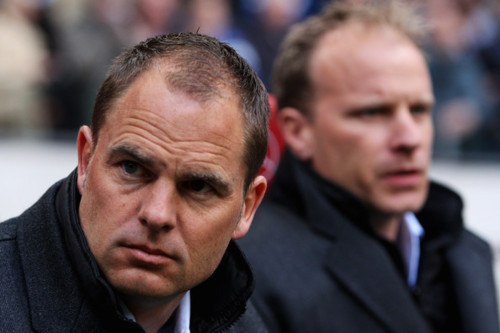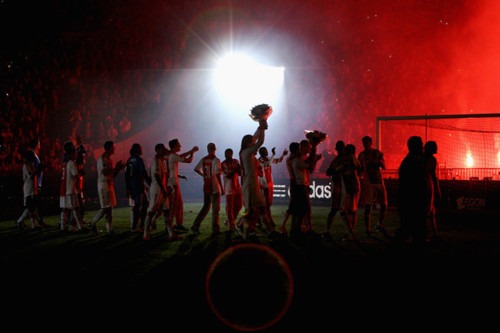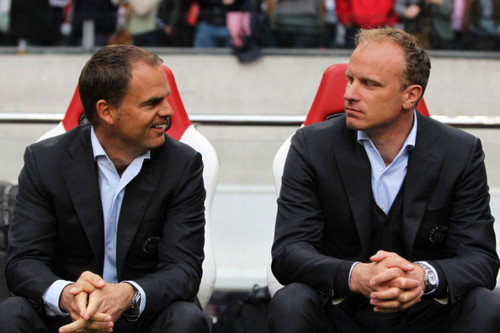Frank de Boer’s vision: The whole is greater than the sum of its parts.
Frank de Boer’s vision: The whole is greater than the sum of its parts.


Jim Collins, in “Good to Great”, wrote the secret of long-term corporate success lies in cultivating a distinctive set of values. For all the talk of diversity and globalisation, this usually means promoting from within and putting down deep local roots. Boris Groysberg, Harvard Business School, affirms companies are too obsessed with hiring stars rather than developing teams.
Both theorists have an ally in Frank de Boer. The difference is that he’s not concerned with Wall Street but the future of AFC Ajax. In essence the former left-back’s vision, to make the Dutch giants top of the food chain again, is the one perpetuated by Johan Cruyff, who championed De Boer to succeed Martin Jol. The legendary number 14 distinctive management model has been proven a success at FC Barcelona. De Boer is hopeful Ajax can enjoy similar riches. “Whether his vision can lead to a utopia in these times remains to be seen.”
After months of upheaval, the Amsterdam club are now restructuring around Cruyff’s philosophy with him in a new role overseeing the transition. Despite his departure from the board he still pulls the strings. With a historic back-to-back Eredivisie won, all eyes focus on the next phase: making an impact in Europe.
Europe is once again the final frontier. A club rich in tradition, decorated with success on the continent, knows the reality is different from years gone by. To once again conquer they will require luck and in the words of De Boer, "sheer belief”. As well as accelerating the individual development of his players. Their ‘daring’ brand of possession-based football, reminiscent of the period between 1986 and 1997 should hold them in good stead. But they will need to be braver, compact as well as clinical. It might not get them far but it’s a start. A presence in the latter stages of European competition is the first objective of a long-term goal.
In order to fulfill such an ambition De Boer has gone back to the future. But what is his and Cruyff’s outlook? The opposite to how Ajax has been run in the past 15 years. Reaching successive European Cup finals in the mid 90s hid a reality. The Dutch club were at a zenith, enjoying their most successful period since the early 70s, but behind the scenes the future wasn’t being safeguarded.
Louis Van Gaal, De Boer’s managerial role model, removed the ‘Michels model’. Individual based training at all levels. In the short-term it wasn’t seen as a big deal, but the subsequent Bosman ruling and rapid globalisation of the game would make the decision a heinous one. Ajax was forced into a slumber they’ve yet to recover from. They might never. But the first steps have been taken by De Boer to rectify things.
This only added more fuel to the fire of the feud between Van Gaal and Cruyff. One that is personal as well as philosophical. Van Gaal wrote in his autobiography of the genesis: “On December 26, 1989, I was a guest at Cruyff’s home with his family for Christmas. The phone rang and I got the news that my sister had died. I immediately left, but I later found out that Johan Cruyff and his family were upset because I left in a rush without thanking him for the invitation.” He would later refute such accusation: “If Van Gaal wrote that, it means he does not remember anything. He must have Alzheimer. Personally, I have no problems with him.”
Personal animosity aside, when it comes to football, their clashes boil down to collective versus individual. “Of course, Louis van Gaal has an understanding of football,” Cruyff said. “But we both have a clear difference in approach.” A good example is when it comes to development of players and running the youth program. Van Gaal, as well as Co Adriaanse, is credited with allowing the deterioration of Ajax’s academy in the mid 90s.
As a coach his approach is on the side of the collective, also applies to how he develops players, often militaristic it’s ultimately geared towards winning. “I do not think he can make Ajax a top club again,” Cruyff stressed. “He will get results short-term, but things have to change in order to improve Ajax.”
Cruyff, believes in the individual, under Van Gaal’s watch there was a shift away from the traditional approach – often referred to as the ‘Michels model’ – effectively the importance of individual training which Cruyff is an ardent supporter. The belief in this is during critical stages of a match, instead of relying on others, the player would solve the predicament himself – for example, running towards goal, he would know whether to shot or make a pass – character building is as much as important as skill development, talent is one thing but with a football brain things become more advantageous.
Also, every player is unique, no two are the same. In terms of ability and talent, each individuals’ strength combines to make a strong eleven. The whole is greater than the sum of its parts. De Boer has bought into this philosophy which has been central to his rebuilding of Ajax. The result: a natural and seamless progression in implementing Van Gaal’s doctrine.

Ajax’s 31st national championship was won by returning to their old principles. The intelligence shown in constant switching of formations in the last few months is a positive sign. De Boer wants to replicate this brand of football against Europe’s elite.
Football to Cruyff is more than just having technique and skills. It help’s having the two add intelligence the player becomes a different beast. “I never practice tricks. I play very simply. That’s what it’s all about,” he said. “The solution that seems the simplest is in fact the most difficult one. With most players, tactics are missing. You can divide tactics into insight, trust and daring.”
His one-time rival and close friend Guus Hiddink is another advocate. “Players should not just run with their legs, but with their head as well,” he said. “They should be conscious of the fact that they constantly have to think during a game. Sometimes players act without thinking. But they have to actively consider how they can break their opponent.”
There are encouraging signs, the next generation – majority of which will ascend to the first team soon – including Viktor Fischer, Stefano Denswil, Joël Veltman, Mitchell Dijks, Fabian Sporkslede, Davy Klaassen and Mats Rits. All have the advantage of being one of the first groups in over two decades to train and develop the same way De Boer did.
“The individual cleverness of the players was missing when I first got here (in 2006 as a youth team coach),” he said. “The individual action at the highest level is essential. We are now in training much more individualized. That is so important.”
This is why the restoration of intelligence is so important coupled with talent can be the difference in losing a game or not. Individual mistakes and loss of concentration when required has been the bane of his existence in the first half of the season. Awareness is something he’s always preached even as a player.
De Boer knew against Real Madrid and Lyon there would be limited openings. Whenever an opportunity arose it had to be seized. In the four games Ajax had nothing to show other than good spells of possession. Although they unfairly had two perfectly legitimate goals disallowed when Madrid came to town. After the 3-0 Bernabéu mauling, the Spanish press were split on the Amsterdammers performance. Some praised them for their bravery others called it naive. Naivety is often the by-product of a lack of experience especially at the highest level. As Immanuel Kant put it “theory without experience is mere intellectual play.”
After what seemed an age, the Dutch club – under Cruyff’s auspices – returned to the latter. This is where the individualized approach comes into play. De Boer, as much as he would like, knows he can’t go into the market and sign a €20M marquee player. Instead Ajax can develop one with the added advantage of being moulded in the clubs philosophy. “We know if we want to survive, we have to generate new players.”

Aside from De Boer on the training field players are individually coached by a stellar cast of former players turned trainers including Jaap Stam, Bryan Roy and Marc Overmars, as well as members of the ‘technical heart’ Wim Jonk and Dennis Bergkamp. Already De Boer has handed professional debuts to nine players including Ricardo van Rhijn this season whose greatly impressed Stam as well as Bergkamp. His rise has seen him named as the clubs talent of the year.
Cruyff’s believes his structural changes can be the solution and will eventually lead his boyhood club returning to the summit of the European game. The same model he introduced at Barça, overhauling from grass roots upwards, is now certain to be adopted. Everything is in place, if much of De Boer’s squad – growing in experience – can be maintained, plus new additions. Amsterdam could be on the cusp of another bright era. A club that has come to define itself through success at home and abroad will never lack the drive and desire to be the best.
Mohamed Moallim is a Dutch football expert who has featured on AFR before. He mostly features on the respectable magazine FourFourTwo and occasionally writes for his own blog La Croqueta.







